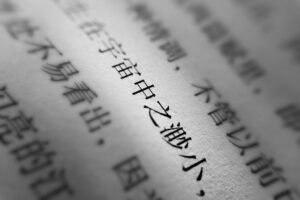Learning Chinese is a fun and exciting journey. Whether you are a student, business professional, or simply want to learn for personal growth, expanding your vocabulary is essential. This article will focus on Chinese health and wellness vocabulary for everyday conversations.
By familiarizing yourself with these terms, you can easily communicate about health concerns, ailments, and overall well-being with native speakers. This knowledge not only enhances your language skills but also deepens your connections with Chinese-speaking individuals.
Table of Contents
ToggleKey Takeaways:
- Learn essential Chinese health and wellness vocabulary for better communication in health-related situations.
- Gaining knowledge about common health issues, medical facilities, and professionals will help you navigate healthcare services in China.
- Adopting healthy lifestyle habits is crucial for overall well-being and can be made easier by learning relevant Chinese vocabulary.
- Understanding nutrition and dietary restrictions is essential for maintaining good health, so we have shared some essential Chinese vocabulary in this article.
- Lastly, mental health is a vital aspect of overall wellness and, therefore, understanding Chinese vocabulary related to emotions, stress management, mental health disorders, and self-care practices is essential.
Common Health Issues
Having a good understanding of common health issues is crucial for effective communication about health. Here are some frequently encountered ailments and health concerns along with their Chinese vocabulary:
| Common Health Issues | Chinese Vocabulary |
|---|---|
| Cold | Gǎnmào (感冒) |
| Cough | Ké sòu (咳嗽) |
| Headache | Tóuténg (头疼) |
| Sore Throat | Hóulóngyān (喉咙炎) |
| Fever | Shārén (沙儿暖) |
| Stomachache | Tùfùténg (肚腹疼) |
| High Blood Pressure | Gāoxuèyā (高血压) |
| Diabetes | Tángniàobìng (糖尿病) |
| Depression | Yōuyùzhèng (忧郁症) |
With this basic knowledge, you can communicate more effectively with healthcare providers and navigate common health issues in daily life. Keep practicing these essential Chinese health and wellness vocabulary to improve your language skills!
Medical Facilities and Professionals
When it comes to seeking medical care, it’s helpful to know the names of medical facilities and professionals in Chinese. Here are some essential healthcare vocabulary words:
| Hospital | 医院 (yī yuàn) |
|---|---|
| Clinic | 诊所 (zhěn suǒ) |
| Doctor | 医生 (yī shēng) |
| Nurse | 护士 (hù shì) |
| Pharmacist | 药剂师 (yào jì shī) |
| Dentist | 牙医 (yá yī) |
Knowing these words can help you navigate healthcare situations more easily and effectively communicate with medical professionals.
Healthy Lifestyle and Habits
Maintaining a healthy lifestyle is paramount to one’s overall well-being. By incorporating healthy habits into your routine, you can enjoy a happier and healthier life. In this section, we will explore Chinese vocabulary related to healthy living, such as:
- 饮食 (yǐn shí) – Nutrition
- 健身 (jiàn shēn) – Exercise
- 放松技巧 (fàng sōng jì qiǎo) – Relaxation techniques
- 睡眠 (shuì mián) – Sleep
- 戒烟 (jiè yān) – Quit smoking
- 戒酒 (jiè jiǔ) – Quit drinking
- 均衡的饮食 (jūn héng de yǐn shí) – Balanced diet
- 瑜伽 (yú jiā) – Yoga
By incorporating these words and phrases into your everyday conversations, you can better communicate with Chinese speakers about your health and well-being practices.
Nutrition and Diet
Proper nutrition and a balanced diet are essential for maintaining good health. Here are some Chinese health and wellness vocabulary related to nutrition and diet:
| Chinese Vocabulary | English Translation |
|---|---|
| 营养 | Nutrition |
| 饮食习惯 | Dietary Habits |
| 蛋白质 | Protein |
| 碳水化合物 | Carbohydrates |
| 蔬菜 | Vegetables |
| 水果 | Fruits |
| 饮料 | Beverages |
| 糖尿病 | Diabetes |
| 乳糖不耐受 | Lactose Intolerance |
Eating a balanced diet with a variety of nutrients can help prevent certain health problems. You may also want to discuss any dietary restrictions you have with your doctor or nutritionist.
Remember, proper nutrition and a healthy diet are essential components of good health!
Mental Health and Well-being
Mental health is just as important as physical health when it comes to overall well-being. It affects how we think, feel, and behave, and can impact our daily lives. In Chinese culture, mental health is often tied to concepts such as yin and yang, qi, and balance.
Emotions
It is important to be able to express and manage emotions in a healthy way. Here are some Chinese words and phrases related to emotions:
- Gao xing – happy
- Bù kāi xīn – sad
- Kǒng pà – afraid
- Jīng yà – nervous
- Wú liáo – bored
Stress Management
In today’s fast-paced society, stress is a common problem. Here are some Chinese vocabulary related to stress management:
- Fáng shì – way/method
- Xīn lǐ fāng shì – psychology/mental technique
- Fāng shì lèi – relaxation method
Mental Health Disorders
Mental health disorders are a serious issue that should be treated with care and compassion. Here are some Chinese words related to mental health disorders:
- Jí é – depression
- Biàn zhèng – diagnosis
- Zhèng jué dào – bipolar disorder
- Dú lì yì shēng zhèng – obsessive-compulsive disorder
- Yáo wù shòu shàng zhèng – substance abuse disorder
Self-care Practices
Self-care practices can help improve mental health and well-being. Here are some Chinese words and phrases related to self-care:
- Zì liáo – self-care
- Xiū xi – rest
- Jiàn kāng yǔ huán jìng – health and environment
- Fú yuè – postpartum recovery
Conclusion
In conclusion, learning Chinese health and wellness vocabulary is essential for effective communication about health and well-being in various situations. By familiarizing yourself with common health issues, medical facilities, healthy lifestyle habits, nutrition and diet, and mental health vocabulary, you can build better connections with native Chinese speakers and improve your language skills.
Remember to keep practicing and incorporating these terms into your everyday conversations. With consistent effort and dedication, you will be able to communicate confidently and accurately about health and wellness in Chinese.
FAQ
What is the purpose of this article?
The purpose of this article is to provide essential Chinese health and wellness vocabulary for everyday conversations, helping to enhance language skills and facilitate better communication in various health-related situations.
What will be covered in the section “Common Health Issues”?
The section “Common Health Issues” will cover Chinese health vocabulary related to common ailments and health concerns.
What vocabulary will be provided in the section “Medical Facilities and Professionals”?
The section “Medical Facilities and Professionals” will provide Chinese vocabulary related to hospitals, clinics, doctors, nurses, and other healthcare professions.
What topics will be explored in the section “Healthy Lifestyle and Habits”?
The section “Healthy Lifestyle and Habits” will explore Chinese vocabulary related to healthy eating, exercise, relaxation techniques, and other habits that promote wellness.
What will be covered in the section “Nutrition and Diet”?
The section “Nutrition and Diet” will focus on Chinese vocabulary related to essential nutrients, food groups, dietary restrictions, and common terms used in nutrition discussions.
What aspects of mental health will be covered in the section “Mental Health and Well-being”?
The section “Mental Health and Well-being” will cover Chinese vocabulary related to emotions, stress management, mental health disorders, and self-care practices.
What can readers expect from this article’s conclusion?
In the conclusion, readers can expect a summary of the essential Chinese health and wellness vocabulary provided in the article, emphasizing the importance of practicing and incorporating these words into conversations with native Chinese speakers.







